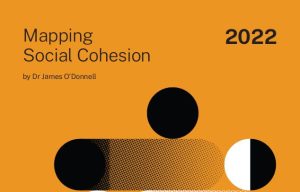Social cohesion in Australia at a ‘critical juncture’ – Scanlon report
Social cohesion in Australia is at a tipping point with levels of national pride and belonging dipping after they rose during the COVID-19 pandemic.
There is also a rising sense of economic and social inequality but support for immigration and multiculturalism is on the rise.
These are the key findings of the 2022 Scanlon Mapping Social Cohesion Report, the 16th in the annual series of cohesion indexes that track five indicators of societal cohesion.
The report’s author Dr James O’Donnell, an ANU demographer, says the survey shows levels of national pride, belonging and a sense of social justice in Australia are lower now than they were before the pandemic.
He says Australia’s pandemic response boosted a sense of national belonging, but that’s now lower than at any point since the surveys began.
 Dr O’Donnell says the study comes as around the world, social, political, and economic turbulence has seen social cohesion emerge as a critical global issue.
Dr O’Donnell says the study comes as around the world, social, political, and economic turbulence has seen social cohesion emerge as a critical global issue.
He says that three key findings emerge from this year’s results.
“Social cohesion in Australia increased during the pandemic but is now declining. As we readjust to life after the pandemic, we are at a crucial tipping point where we can solidify and strengthen social cohesion or allow it to further weaken,” Dr O’Donnell said.
“Australia’s population-wide support for multiculturalism is high and growing, and it is an enormous advantage in responding to the pressures placed on social cohesion.
“Also the degree to which we feel a sense of belonging and connectedness in our neighbourhoods has been high and growing since the start of the pandemic. However, our sense of pride, belonging, and social justice in Australia are declining and are now at their lowest levels since 2007,” Dr O’Donnell said.
The report says social inclusion and justice in Australia increased strongly during the pandemic “probably reflecting a positive public response to government measures to protect health and financial wellbeing”.
It says the current economic woes and inflation shock is eroding people’s sense of security. Two-in-five people cited economic issues as the most important problem facing Australia in 2022, and 75 per cent of respondents are worried about a severe downturn in the global economy, the highest proportion since the question was first asked.
The survey found 35 per cent of respondents were dissatisfied with their financial situation – up from 29 per cent in 2021.
Sentiment about economic equality was also in decline, the survey found with 36 per cent saying the gap in incomes between wealthy and poor was too big; and just 14 per cent of people agreeing with the notion that “Australia is a land of economic opportunity”.
The survey found trust in government remained higher than pre-pandemic levels with 41 per cent of those surveyed saying the federal government can be trusted to do the right thing all or some of the time.
Also, 49 per cent of respondents said most people could be trusted, which is down from the peak in November 2020 of 52 per cent. Social trust and neighbourhood cohesion also remains high and resilient.
The survey showed Australians continue to strongly support ethnic diversity and multiculturalism, in line with a long-term positive trend.
A record 78 per cent of respondents said that immigration and multiculturalism had been good for Australia and 87 per cent said immigration had been good for the economy.
Furthermore, 81 per cent said they had friends who were from different ethnic communities or religious groups.
And 78 per cent disagreed with the idea that migrants and refugees take jobs from Australians.
But people also continue to experience discrimination based on their skin colour, ethnic origin, or religion, with 16 per cent reporting experience of discrimination – a figure consistent with previous years.
But awareness about the issue of racism is on the rise, the survey found, especially among Australia-born respondents.
During COVID pandemic period, 40 per cent of respondents thought racism was problem in Australia but this figure has rose to 60 per cent in 2022.
Negative perceptions also persist in Australia about different groups, including Muslim Australians and non-European migrants.
While 90 per cent of respondents have positive views about migrants from Europe or the United Kingdom, this drops to 70 per for Indian immigrants, and about 60 per cent for arrivals from Ethiopia, Lebanon, China, Iraq and Sudan.
However, the overall trend in racial harmony is positive. In 2020, 52 per cent of respondents reported having positive feelings towards Chinese immigrants. In 2022, that increased to 61 per cent.
During that same timeframe, respondents with negative attitudes towards Muslims decreased from 40 per cent in 2020 to 29 per cent in 2022.
The research also assessed sentiment around the aboriginal voice to parliament. The survey found almost 60 per cent of respondents either agreed or strongly agreed with the proposal. One in five respondents disagreed.
People born overseas were also overwhelming supportive. But a third of this cohort was unsure about the details.
“Social cohesion in Australia is at a critical juncture. The opportunities and threats suggest that a return to pre-pandemic stability is possible but not inevitable,” the report concluded.
“The history of and public support for multiculturalism is a great asset to Australia – insulating us from deeper divisions.
“Social and economic inequalities, financial and cost of living pressures, experience of discrimination and concern for national and global issues are weighing on social cohesion,” the report says.
The latest Scanlon survey was conducted in July and canvased almost 5,800 respondents, the largest in the history of the survey.
See the full report here: Mapping Social Cohesion | Scanlon institute












